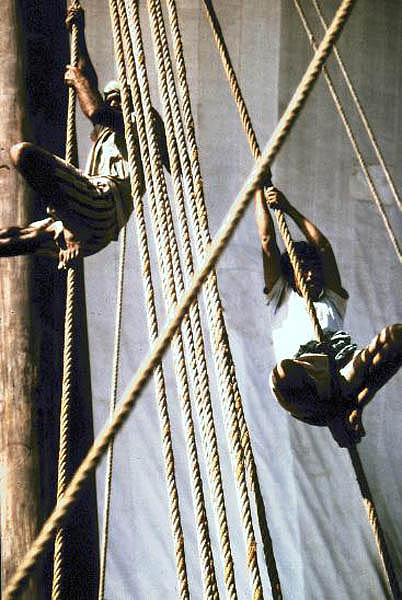The expression "break a leg" replaces the phrase "good luck" which is considered unlucky. The expression is sometimes used outside the theatre, as superstitions and customs travel through other professions and then into common use. If someone says "good luck", they must go out of the theatre, turn around 3 times, spit, curse, then knock on the door and ask to be re-admitted to the theatre.
GHOSTS

One ghost-related superstition is that the theater should always be closed one night a week to give the ghosts a chance to perform their own plays. This is traditionally on Monday night, conveniently giving actors a day off after weekend performances.
Theaters that have stood for more than a few decades tend to have lots of associated ghost stories, more than other public buildings of similar age.
The Ghost light
One should always leave a light burning in an empty theatre. Traditionally, the light is placed downstage center. That is, closest to the audience, center stage. Several reasons are given for this, all having to do with ghosts:
1. The light wards off ghosts.
2. A theater's ghosts always want to have enough light to see. Failure to provide this may anger them, leading to 'pranks' being played or other mishaps.
3. It prevents non-spectral personnel from having to cross the stage in the dark, falling into the orchestra pit, dying in the fall and becoming ghosts themselves.
4. Though it's a superstition, it does have practical value: The backstage area of a theater tends to be cluttered, so someone who enters a completely darkened space is liable to be injured while hunting for a light switch.
WHISTLING
Related to a similar rule for sailing ships, it is considered bad luck for an actor to whistle on or off stage. As original stage crews were hired off of ships in port (Rigging in the theatre has its origins in sailing rigging), sailors, and therefore theatrical riggers, used coded whistles to communicate scene changes. Actors who whistled could confuse them into changing the set or scenery, though in today's theatres, the stage crew normally uses an intercom or cue-light system.
SCRIPT UNDER THE PILLOW
A common superstition held by actors is that sleeping with a script under their pillow will help them to learn it faster.
MISCELLANEOUS
No real money should be used on stage. This may derive from gamblers' superstitions about money, or it could just be a sensible precaution against theft. In a similar vein, it is considered unlucky to wear real jewelry on stage, as opposed to costume jewellry.
It is bad luck to complete a performance of a play without an audience in attendance, so one should never say the last line of a play during rehearsals. To get around this, some production companies allow a limited number of people (usually friends, family, and reviewers) to attend the dress rehearsals.
A bad dress rehearsal foretells a good opening night. However, it has a tendency to be true in that cast and crew are scared straight by a bad dress rehearsal and therefore fix their mistakes by opening night.
A company should not practice doing their bows before they feel they deserve them.
Gifts such as flowers should be given to actors after a show, as opposed to before.
Peacock feathers should never be brought on stage, either as a costume element, prop, or part of a set-piece. Many veteran actors and directors tell stories of sets collapsing and other such events during performances with peacock feathers.
Some actors believe that having a Bible onstage is unlucky. Often, other books or prop books will be used with Bible covers.
The color blue is considered unlucky, unless countered by wearing silver. As blue dye was once very costly; a failing acting company would dye some of their garments blue in the hopes of pleasing the audience. As for the silver to counter it, one would know that the acting company was truly wealthy, so to enable actors to wear real silver.
As part of warm-ups before a show, some casts get together and say "Shit!" to avoid doing it during the performance if something goes wrong.
MIRRORS
It is very unlucky to use real mirrors on stage. An actor, also, should not look into a mirror over the shoulder of another, so that the two reflections are seen together. Doing this will bring certain mis-fortune to the one overlooked.
The Origin:
Real mirrors on a stage have a tendency to play havoc with a lighting design, reflecting rectangles of light into places never inteded to be lit. Also, actors tend to be vain, and a mirror is simply an unneccessary distraction. Real jewelry, also, reflects the lights in obscure and unwanted ways.






